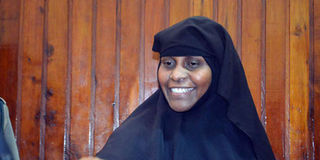Terror suspects walk free as lack of proof cripples prosecution

Hania Sagar arraigned in Mombasa on October 5, 2018. She was set free after being jailed on terror-related charges. PHOTO | FILE | NATION MEDIA GROUP
What you need to know:
- Besides the poor handling of electronic gadgets and items recovered from suspects, poor chain of custody and prolonged time in extraction are the other factors.
- Judge Makori noted that, to link an accused person to a terror group or prove possession of extremist literature, the prosecution has to prove this by presenting circumstantial evidence.
The difficulty in proving suspects’ links to proscribed groups is turning into a major headache for prosecutors in terror-related cases.
And the secretive nature of these groups is the biggest impediment to proving individuals’ links to them when they are taken to court because such groups lack formal structures through which their activities can be tracked.
Take the case of Halima Adan, Ummulkheir Sadri Abdalla and Khadija Abubakar Abdulkadir, who were accused of being members of the Al-Shabaab terror group.
Mombasa Chief Magistrate Evans Makori set them free on February 26, 2019 on grounds that the prosecution had failed to prove the 20 terror-related charges the accused were facing.
Mr Makori said the burden of proof rested squarely with the prosecution to link the accused directly to the group.
In the many cases where the accused deny being members of a terrorist group, the prosecution has faced an uphill task in proving links.
MEMBERSHIP
In a ruling by Justice Grace Ngenye, the High Court judge noted that, in ordinary circumstances, a membership in an organisation is easily determined due to the existence of formal structures.
“However, membership to a terrorist group may not be so easily determinable, thus use of circumstantial evidence that points to the person’s association with such a group. Several considerations will come into play and supported by relevant evidence that would point to such conclusion,” she said in the judgment.
According to Justice Ngenye, terrorist organisations operate underground and use covert means to recruit members and to advance their causes.
It is, therefore, upon the prosecution to clearly set out acts that constitute membership to Shabaab.
“It must be shown that there is a nexus between the actions of the accused and the operations of the outlawed group so as to enable the court reach a verdict on his membership.
"Due to the nature of the group’s operations, there is not yet a standard test that would apply as a checklist to a person’s membership to Al-Shabaab,” she says.
ACQUITTALS
The judge, however, believes that certain actions such as a person being trained by the group, travelling to the known bases or associating with known members of the group among others may provide a useful guide.
The release of the three women came five days after widow of slain cleric Aboud Rogo, Hania Sagar, was also acquitted.
The Sunday Nation has documented at least 10 cases of terror suspects charged with being members of Al-Shabaab terror group but who were released for lack of evidence.
An analysis by the Sunday Nation established that inability by the police to link the suspects to the offences, provision of water tight evidence against them and lack of witnesses to give testimony are among some of the loopholes that have seen suspects walk to freedom.
Besides the poor handling of electronic gadgets and items recovered from suspects, poor chain of custody and prolonged time in extraction are the other factors.
EVIDENCE
Investigators often fail to contact mobile service providers to provide contents of conversations between the suspects and their alleged accomplices or to prove M-Pesa transactions have also left the prosecution with little to go on.
In at least five cases familiar to the Sunday Nation between last year to date, terror suspects have secured their freedom after the prosecution failed to prove the charges against them.
Among the cases are that of Nassir Abdallah Skanda, Hania Sagar Rogo, Sheikh Mohammed Khalid, Mr Samuel Wanjala Wabwile, alias Salim Mohamed, Abdirazak Salah Salah, Ms Luul Ali Tahli, Ms Nasteho Ali Tahli, Ms Zamzam Abdallahi and Yasir Azam Abdulakhan.
Others are Mr Mohamed Ibrahim Noor, Ms Nargis Arafat Gulan, Ms Mwanajuma Mweru Tayari and Ms Saumu Ali Athman.
They were all accused of being members of Al-Shabaab and possessing articles believed to be used in commission of terror activities.
For the state to prove these charges, investigators must produce evidence that the accused were watching and distributing the videos and photos for the purposes of propagating and spreading terrorism.
Mr Makori noted that, to link an accused person to a terror group or prove possession of extremist literature, the prosecution has to prove this by presenting circumstantial evidence.





